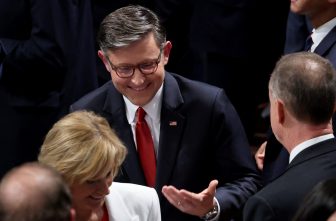A Catholic Schools Commission named by Archbishop John Nienstedt has been charged with bringing a set of recommendations to him by June to help ensure the strength and sustainability of Catholic elementary schools throughout the archdiocese.
The 16-member commission includes educators, priests and business leaders among its membership. It is building on the work that was done over the past two years by the archdiocesan Strategic Planning Task Force and a national Catholic education consulting group hired last fall by the archdiocese to bring a broader perspective to the local conversation about Catholic schools.
Four areas of focus
The Commission will make recommendations in four strategic areas: academic quality, financial management, governance and advancement.
It also will lay the groundwork for an Archdiocesan Schools Advisory Board, to be formed this summer. This advisory board will build upon the work of the commission and provide ongoing evaluation and support to Catholic schools, as called for in the archdiocesan strategic plan announced last October.
“The purpose of [the Catholic Schools Commission] is to put the Catholic schools on a sustainable growth path for the next 20 years,” said John McMahon, a co-chair of the commission who is director of federal tax services with Ernst & Young and a member of Holy Spirit in St. Paul.
“To do that, we have a consultants’ report and we need to listen to the various stakeholders to assess our issues and opportunities and to make actionable recommendations in those four principal areas,” he said.
The ultimate goal is to help schools “provide a high-quality Catholic education” for students and families, added co-chair Karen Rauenhorst, a community volunteer, trustee of the archdiocese and member of Holy Name of Jesus in Medina.
The archdiocese currently has 84 Catholic elementary schools that are affiliated with a parish. In 2010, approximately 22,000 students attended those schools.
The Strategic Plan itself calls for further evaluation of the sustainability of all Catholic schools.
The first phase of a school review process was completed in January by 10 parish schools slated for “urgent review.” Two of those schools — St. Joseph School in Red Wing and St. Mathias School in Hampton — will close at the end of the 2010-2011 academic year, while the remainder will stay open. San Miguel Middle School, which is independently administered by the DeLaSalle Christian Brothers, completed its own review process and also made the decision to close.
Helping schools adapt
Catholic schools face a variety of challenges today, including shifts in socio-economic trends, economic pressures, the proliferation of new technology, and increasing competition from other schools.
The commission’s goal is to help Catholic schools adapt to those challenges, McMahon said.
Commission members will craft their recommendations based in part on information that was gathered by the Strategic Planning Task Force and recommendations made by the Alliance for Catholic Education (ACE) at the University of Notre Dame, McMahon said.
Among ACE’s recommendations are:
» to establish an Archdiocesan Schools Advisory board as well as advisory boards at individual schools;
» to establish archdiocesan learning standards for pre-kindergarten through eighth grade;
» to develop a centralized program to identify, recruit and develop principals;
» to ensure all Catholic elementary schools develop individualized marketing and enrollment management plans;
» to establish a framework for consistent financial management and reporting.
“We want to make sure we’re doing things right,” said Rauenhorst, who noted that the Catholic Schools Commission’s focus is consistent with work being done in other dioceses regarding Catholic education. “Catholic schools are really competing with other Catholic schools, with charter schools and with public schools, and we have to be on top of all the different issues out there. We really want our schools to model best practices.”
McMahon said achieving consistency in financial reporting and governance is an area that commission members will address “not from a command-and-control standpoint, but really to make all the schools stronger — taking the best governance structures and the best financial reporting so that we have tools and mechanisms to be nimble and adapt to the market and strengthen Catholic education.”
Listening to stakeholders
The Catholic Schools Commission includes four committees, each with a separate focus: educational excellence, funding models, governance and advancement. Each committee is comprised of members of the commission as well as principals, pastors and experts in those fields.
Commission and committee members plan to do a lot of listening between now and when recommendations are made to the archbishop in June, Rauenhorst said.
They have met with principals and presidents of Catholic schools and will be visiting with pastors and parish administrators as well as focus groups.
“For this process to really have an impact, we want to hear feedback from our constituents — that’s really the whole Catholic community,” McMahon said.
Those who would like to comment about the process are invited to e-mail cscommission@archspm.org.




